
xiaozhi-esp32
Build your own AI friend
Stars: 10176
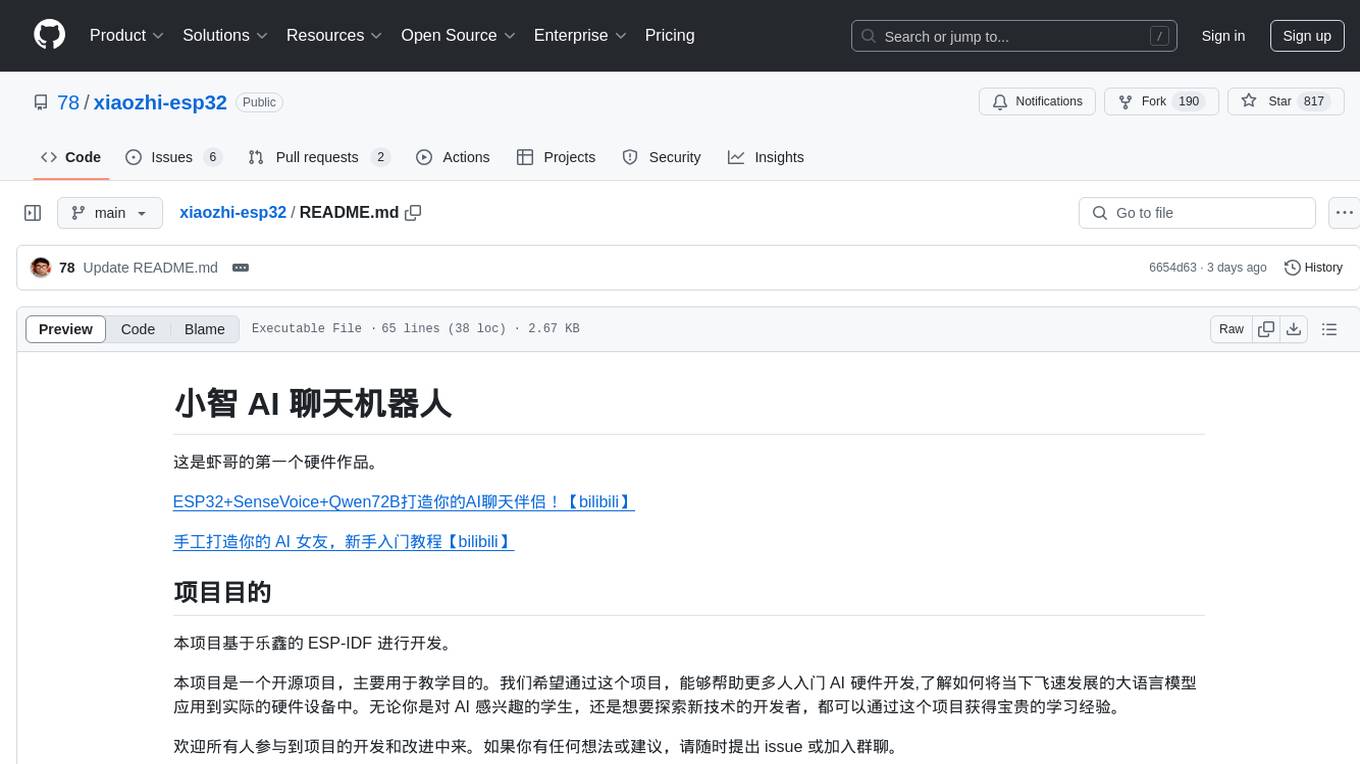
The xiaozhi-esp32 repository is the first hardware project by Xia Ge, focusing on creating an AI chatbot using ESP32, SenseVoice, and Qwen72B. The project aims to help beginners in AI hardware development understand how to apply language models to hardware devices. It supports various functionalities such as Wi-Fi configuration, offline voice wake-up, multilingual speech recognition, voiceprint recognition, TTS using large models, and more. The project encourages participation for learning and improvement, providing resources for hardware and firmware development.
README:
这是虾哥的第一个硬件作品。
👉 ESP32+SenseVoice+Qwen72B打造你的AI聊天伴侣!【bilibili】
👉 给小智装上 DeepSeek 的聪明大脑【bilibili】
👉 手工打造你的 AI 女友,新手入门教程【bilibili】
本项目是一个开源项目,以 MIT 许可证发布,允许任何人免费使用,并可以用于商业用途。
我们希望通过这个项目,能够帮助更多人入门 AI 硬件开发,了解如何将当下飞速发展的大语言模型应用到实际的硬件设备中。无论你是对 AI 感兴趣的学生,还是想要探索新技术的开发者,都可以通过这个项目获得宝贵的学习经验。
欢迎所有人参与到项目的开发和改进中来。如果你有任何想法或建议,请随时提出 Issue 或加入群聊。
学习交流 QQ 群:376893254
- Wi-Fi / ML307 Cat.1 4G
- BOOT 键唤醒和打断,支持点击和长按两种触发方式
- 离线语音唤醒 ESP-SR
- 流式语音对话(WebSocket 或 UDP 协议)
- 支持国语、粤语、英语、日语、韩语 5 种语言识别 SenseVoice
- 声纹识别,识别是谁在喊 AI 的名字 3D Speaker
- 大模型 TTS(火山引擎 或 CosyVoice)
- 大模型 LLM(Qwen, DeepSeek, Doubao)
- 可配置的提示词和音色(自定义角色)
- 短期记忆,每轮对话后自我总结
- OLED / LCD 显示屏,显示信号强弱或对话内容
- 支持 LCD 显示图片表情
- 支持多语言(中文、英文)
详见飞书文档教程:
面包板效果图如下:
- 立创·实战派 ESP32-S3 开发板
- 乐鑫 ESP32-S3-BOX3
- M5Stack CoreS3
- AtomS3R + Echo Base
- AtomMatrix + Echo Base
- 神奇按钮 2.4
- 微雪电子 ESP32-S3-Touch-AMOLED-1.8
- LILYGO T-Circle-S3
- 虾哥 Mini C3
- Moji 小智AI衍生版
- 璀璨·AI吊坠
- 无名科技Nologo-星智-1.54TFT
- 无名科技Nologo-星智-0.96TFT
- SenseCAP Watcher
新手第一次操作建议先不要搭建开发环境,直接使用免开发环境烧录的固件。
固件默认接入 xiaozhi.me 官方服务器,目前个人用户注册账号可以免费使用 Qwen 实时模型。
- Cursor 或 VSCode
- 安装 ESP-IDF 插件,选择 SDK 版本 5.3 或以上
- Linux 比 Windows 更好,编译速度快,也免去驱动问题的困扰
- 使用 Google C++ 代码风格,提交代码时请确保符合规范
如果你已经拥有一个小智 AI 聊天机器人设备,可以登录 xiaozhi.me 控制台进行配置。
在个人电脑上部署服务器,可以参考另一位作者同样以 MIT 许可证开源的项目 xiaozhi-esp32-server
For Tasks:
Click tags to check more tools for each tasksFor Jobs:
Alternative AI tools for xiaozhi-esp32
Similar Open Source Tools

xiaozhi-esp32
The xiaozhi-esp32 repository is the first hardware project by Xia Ge, focusing on creating an AI chatbot using ESP32, SenseVoice, and Qwen72B. The project aims to help beginners in AI hardware development understand how to apply language models to hardware devices. It supports various functionalities such as Wi-Fi configuration, offline voice wake-up, multilingual speech recognition, voiceprint recognition, TTS using large models, and more. The project encourages participation for learning and improvement, providing resources for hardware and firmware development.
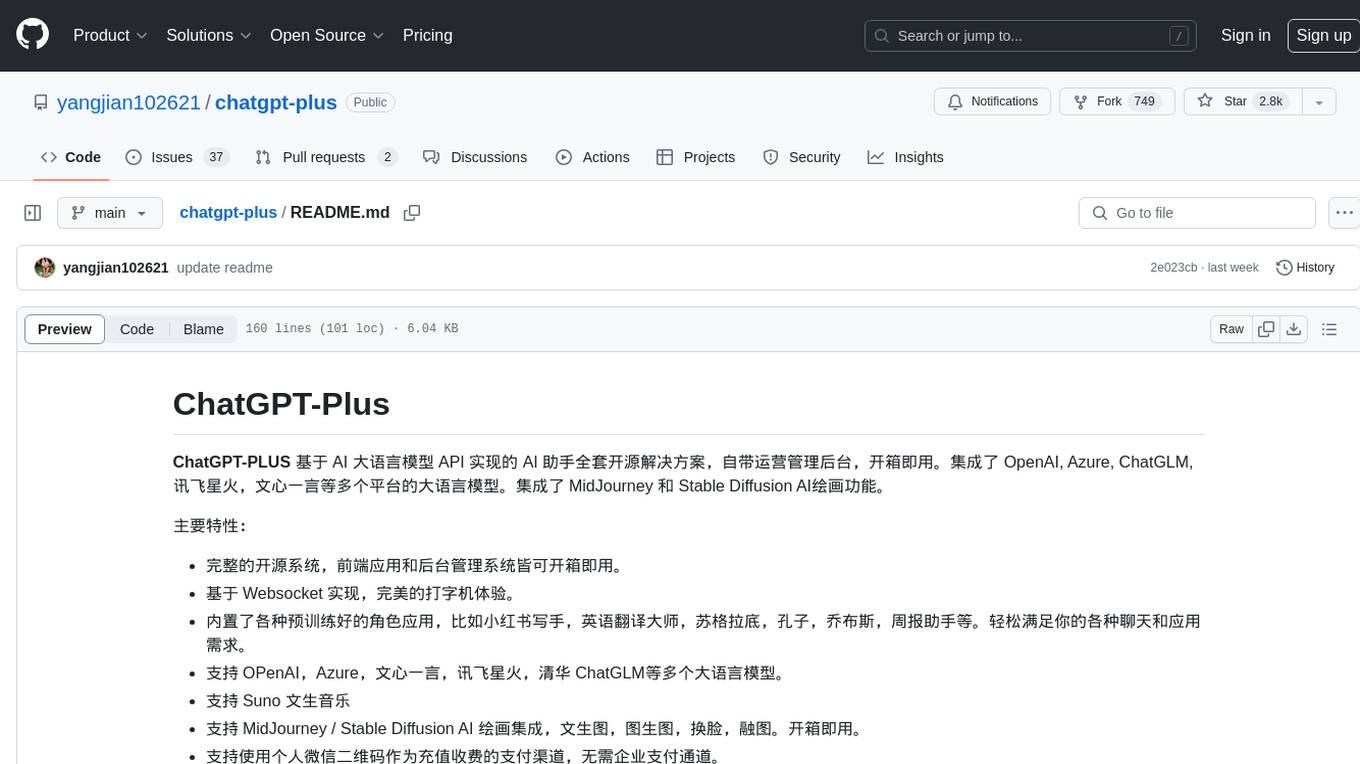
chatgpt-plus
ChatGPT-PLUS is an open-source AI assistant solution based on AI large language model API, with a built-in operational management backend for easy deployment. It integrates multiple large language models from platforms like OpenAI, Azure, ChatGLM, Xunfei Xinghuo, and Wenxin Yanyan. Additionally, it includes MidJourney and Stable Diffusion AI drawing features. The system offers a complete open-source solution with ready-to-use frontend and backend applications, providing a seamless typing experience via Websocket. It comes with various pre-trained role applications such as Xiaohongshu writer, English translation master, Socrates, Confucius, Steve Jobs, and weekly report assistant to meet various chat and application needs. Users can enjoy features like Suno Wensheng music, integration with MidJourney/Stable Diffusion AI drawing, personal WeChat QR code for payment, built-in Alipay and WeChat payment functions, support for various membership packages and point card purchases, and plugin API integration for developing powerful plugins using large language model functions.
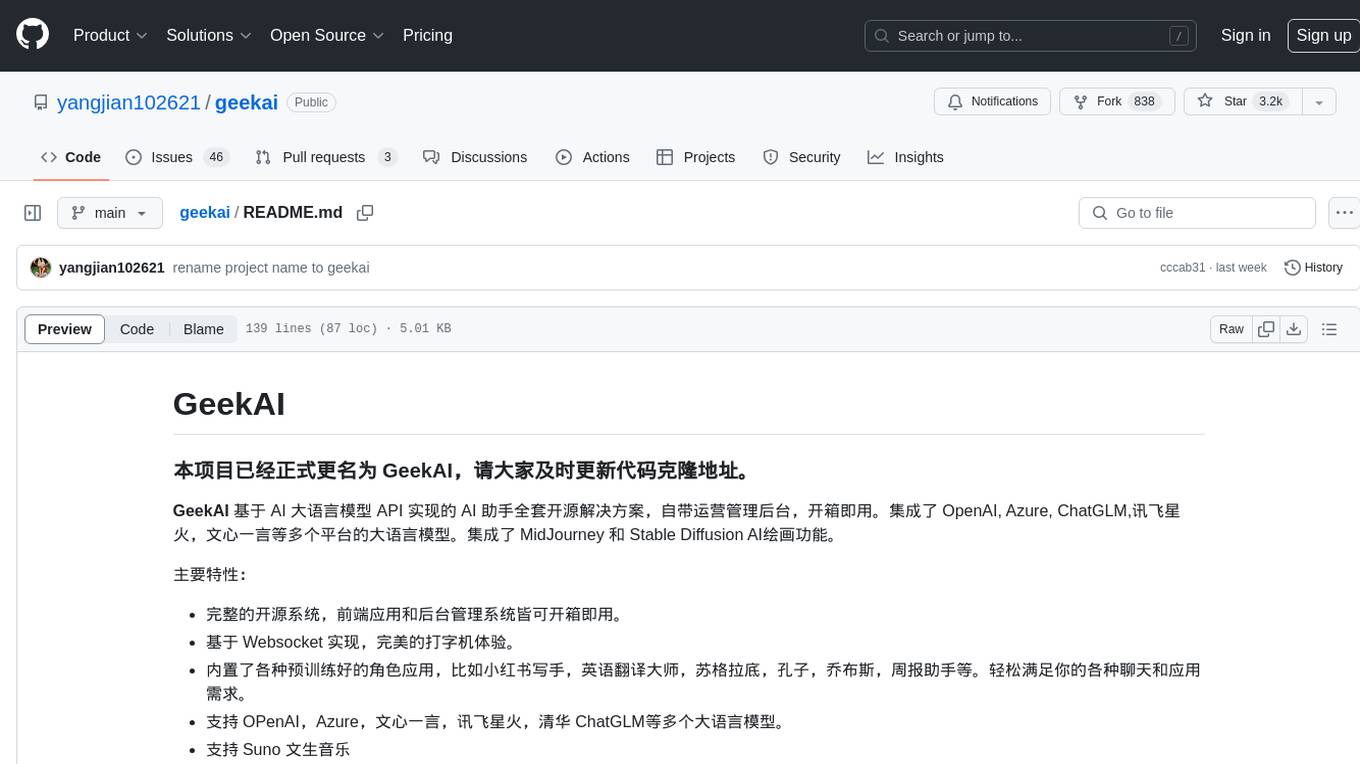
geekai
GeekAI is an open-source AI assistant solution based on AI large language model API, featuring a complete system with ready-to-use front-end and back-end management, providing a seamless typing experience via Websocket. It integrates various pre-trained character applications like Xiaohongshu writing assistant, English translation master, Socrates, Confucius, Steve Jobs, and weekly report assistant. The tool supports multiple large language models from platforms like OpenAI, Azure, Wenxin Yanyan, Xunfei Xinghuo, and Tsinghua ChatGLM. Additionally, it includes MidJourney and Stable Diffusion AI drawing functionalities for creating various artworks such as text-based images, face swapping, and blending images. Users can utilize personal WeChat QR codes for payment without the need for enterprise payment channels, and the tool offers integrated payment options like Alipay and WeChat Pay with support for multiple membership packages and point card purchases. It also features a plugin API for developing powerful plugins using large language model functions, including built-in plugins for Weibo hot search, today's headlines, morning news, and AI drawing functions.
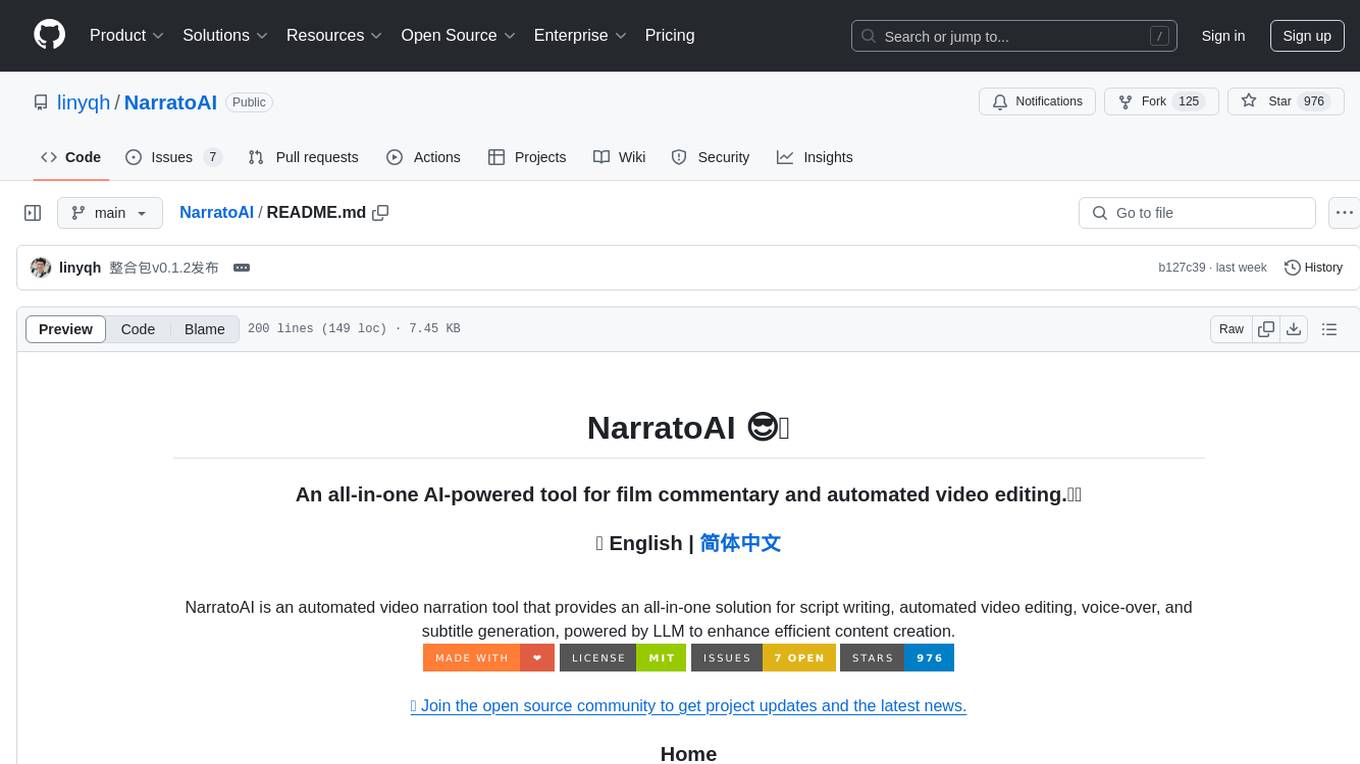
NarratoAI
NarratoAI is an automated video narration tool that provides an all-in-one solution for script writing, automated video editing, voice-over, and subtitle generation. It is powered by LLM to enhance efficient content creation. The tool aims to simplify the process of creating film commentary and editing videos by automating various tasks such as script writing and voice-over generation. NarratoAI offers a user-friendly interface for users to easily generate video scripts, edit videos, and customize video parameters. With future plans to optimize story generation processes and support additional large models, NarratoAI is a versatile tool for content creators looking to streamline their video production workflow.
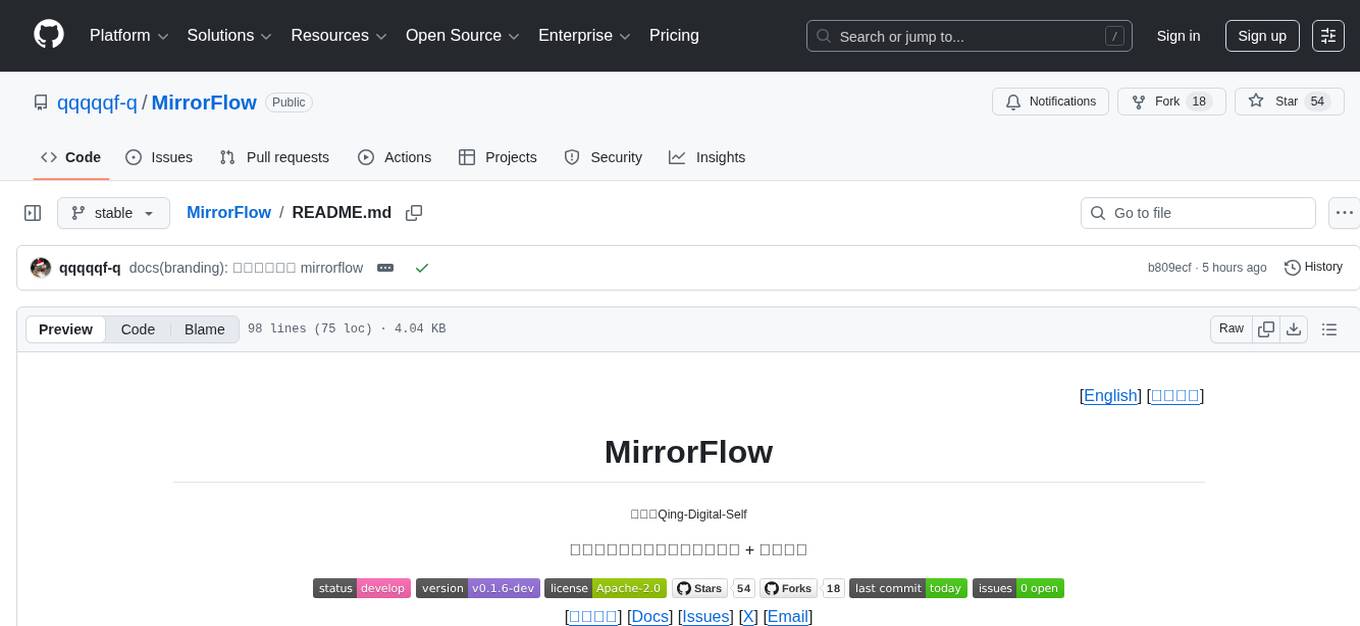
MirrorFlow
MirrorFlow is an end-to-end toolchain for dialogue data processing, cleaning/extraction, trainable samples generation, fine-tuning/distillation, and usage with evaluation. It supports two main routes: 'Digital Self' for fine-tuning chat records to mimic user expression habits and 'GPT-4o Style Alignment' for aligning output structures, clarification methods, refusal habits, and tool invocation behavior.
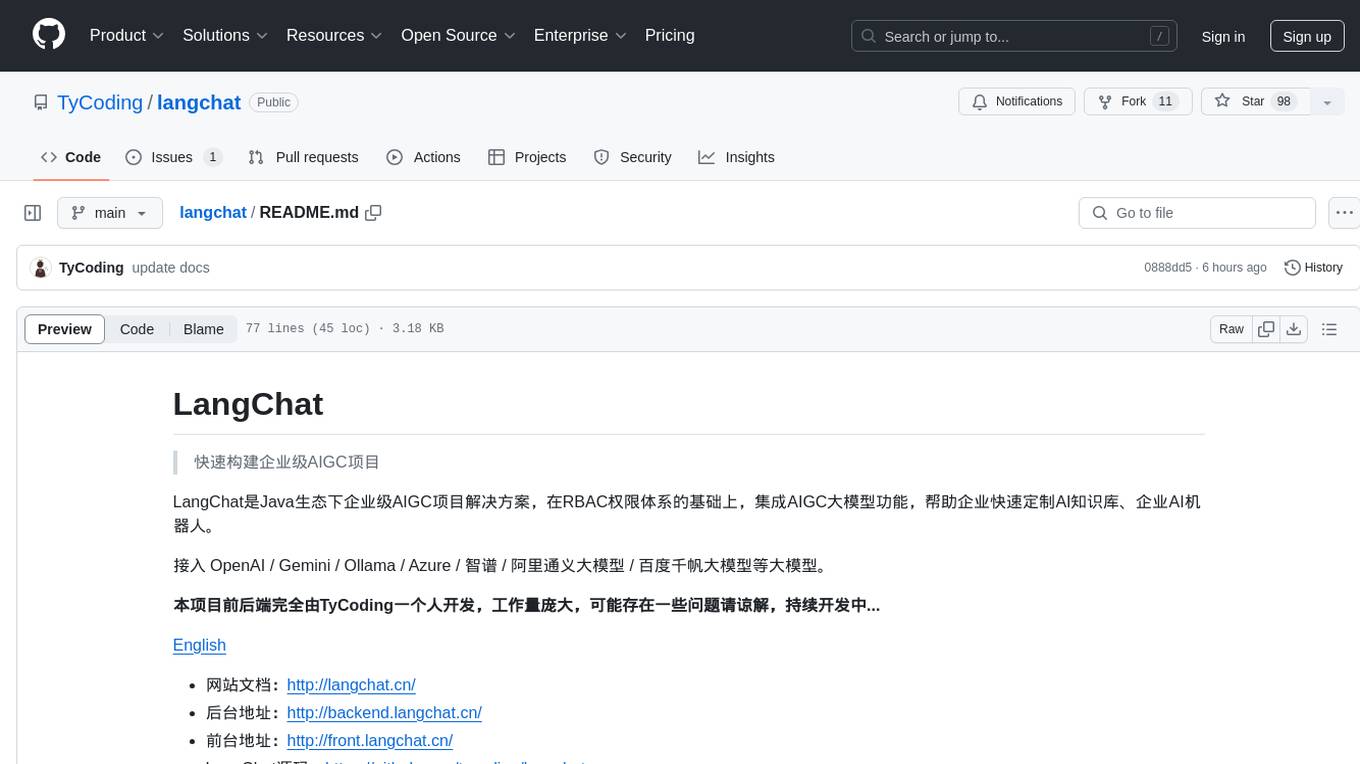
langchat
LangChat is an enterprise AIGC project solution in the Java ecosystem. It integrates AIGC large model functionality on top of the RBAC permission system to help enterprises quickly customize AI knowledge bases and enterprise AI robots. It supports integration with various large models such as OpenAI, Gemini, Ollama, Azure, Zhifu, Alibaba Tongyi, Baidu Qianfan, etc. The project is developed solely by TyCoding and is continuously evolving. It features multi-modality, dynamic configuration, knowledge base support, advanced RAG capabilities, function call customization, multi-channel deployment, workflows visualization, AIGC client application, and more.
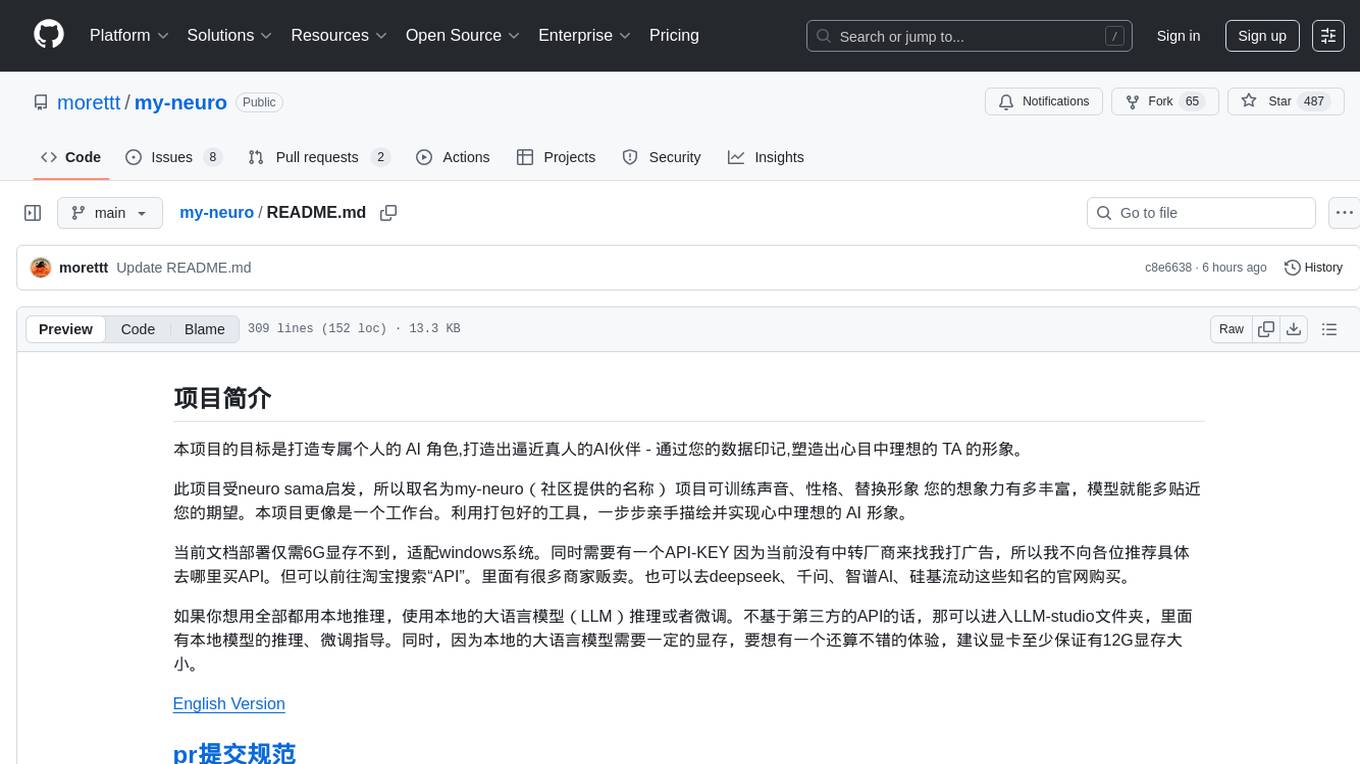
my-neuro
The project aims to create a personalized AI character, a lifelike AI companion - shaping the ideal image of TA in your mind through your data imprint. The project is inspired by neuro sama, hence named my-neuro. The project can train voice, personality, and replace images. It serves as a workspace where you can use packaged tools to step by step draw and realize the ideal AI image in your mind. The deployment of the current document requires less than 6GB of VRAM, compatible with Windows systems, and requires an API-KEY. The project offers features like low latency, real-time interruption, emotion simulation, visual capabilities integration, voice model training support, desktop control, live streaming on platforms like Bilibili, and more. It aims to provide a comprehensive AI experience with features like long-term memory, AI customization, and emotional interactions.
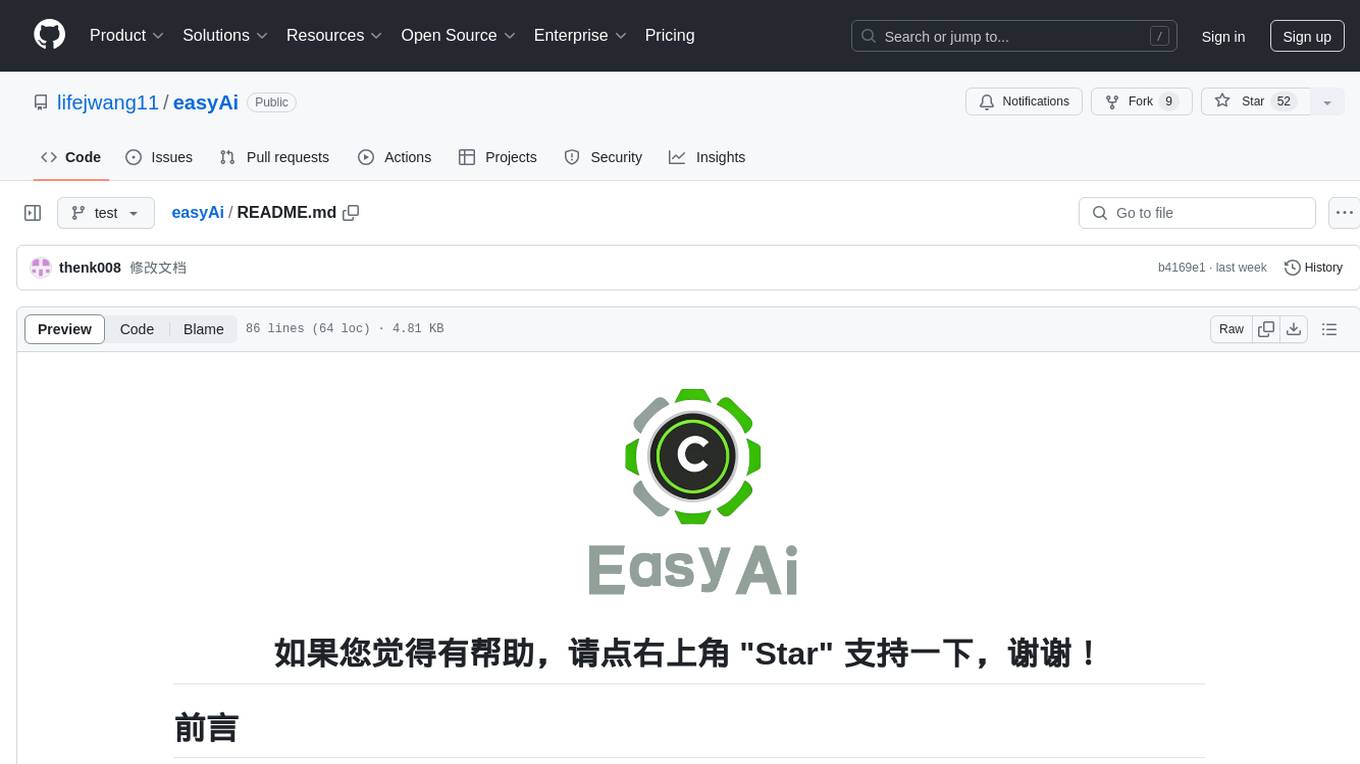
easyAi
EasyAi is a lightweight, beginner-friendly Java artificial intelligence algorithm framework. It can be seamlessly integrated into Java projects with Maven, requiring no additional environment configuration or dependencies. The framework provides pre-packaged modules for image object detection and AI customer service, as well as various low-level algorithm tools for deep learning, machine learning, reinforcement learning, heuristic learning, and matrix operations. Developers can easily develop custom micro-models tailored to their business needs.
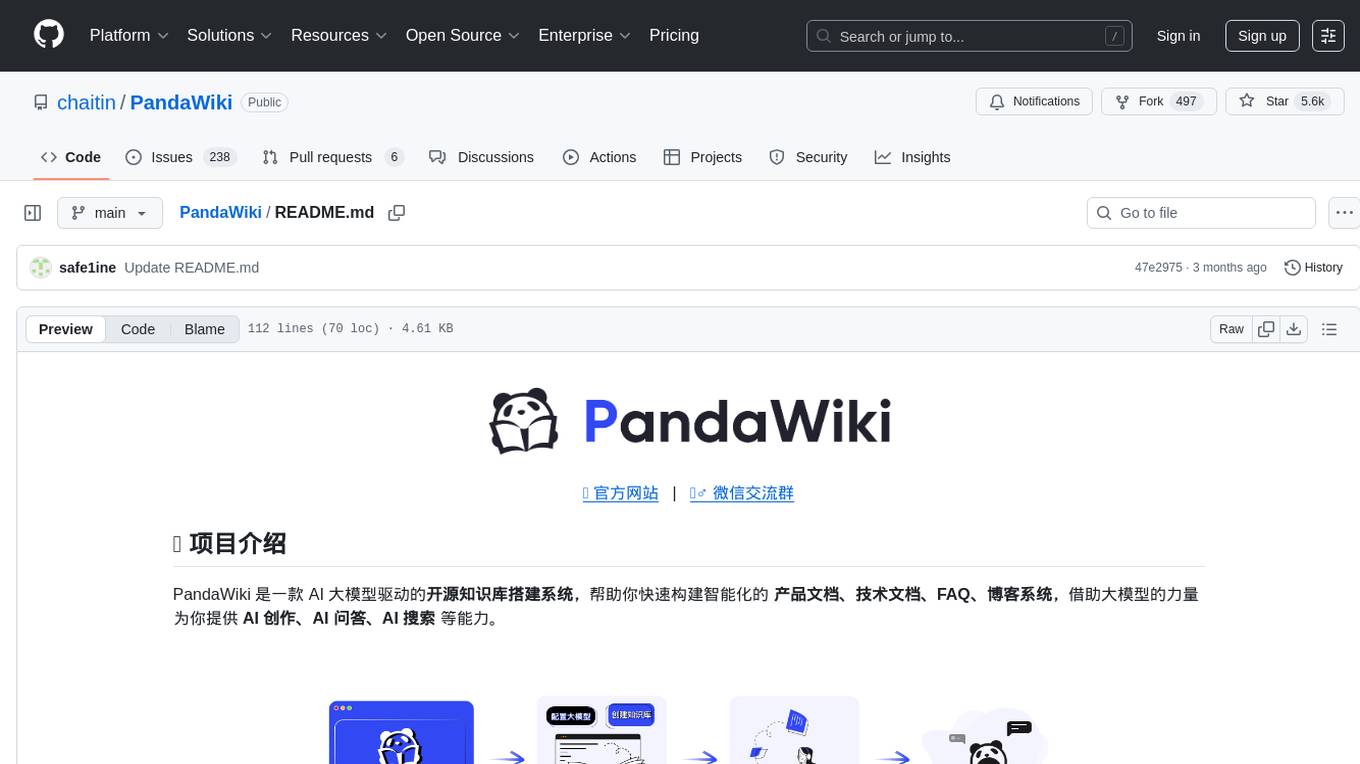
PandaWiki
PandaWiki is a collaborative platform for creating and editing wiki pages. It allows users to easily collaborate on documentation, knowledge sharing, and information dissemination. With features like version control, user permissions, and rich text editing, PandaWiki simplifies the process of creating and managing wiki content. Whether you are working on a team project, organizing information for personal use, or building a knowledge base for your organization, PandaWiki provides a user-friendly and efficient solution for creating and maintaining wiki pages.
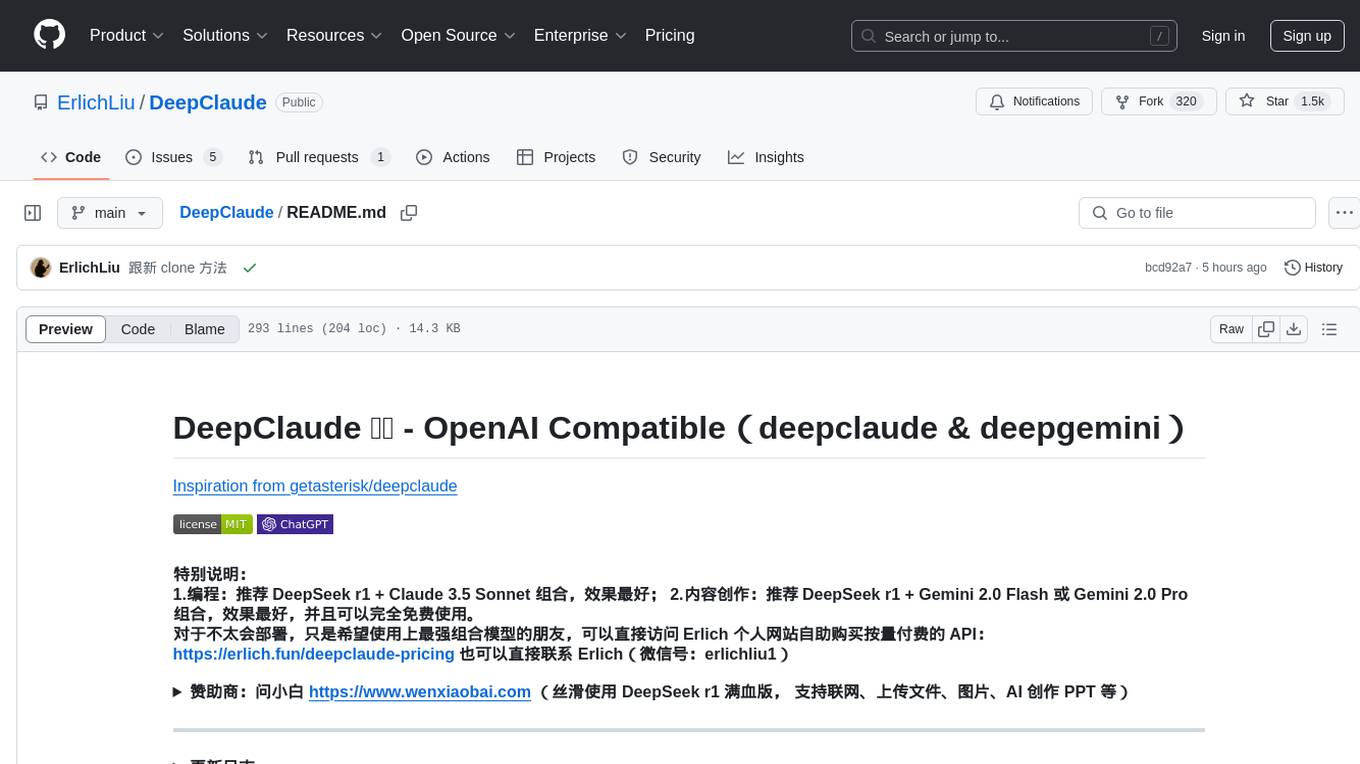
DeepClaude
DeepClaude is an open-source project inspired by the DeepSeek R1 model, aiming to provide the best results in various tasks by combining different models. It supports OpenAI-compatible input and output formats, integrates with DeepSeek and Claude APIs, and offers special support for other OpenAI-compatible models. Users can run the project locally or deploy it on a server to access a powerful language model service. The project also provides guidance on obtaining necessary APIs and running the project, including using Docker for deployment.
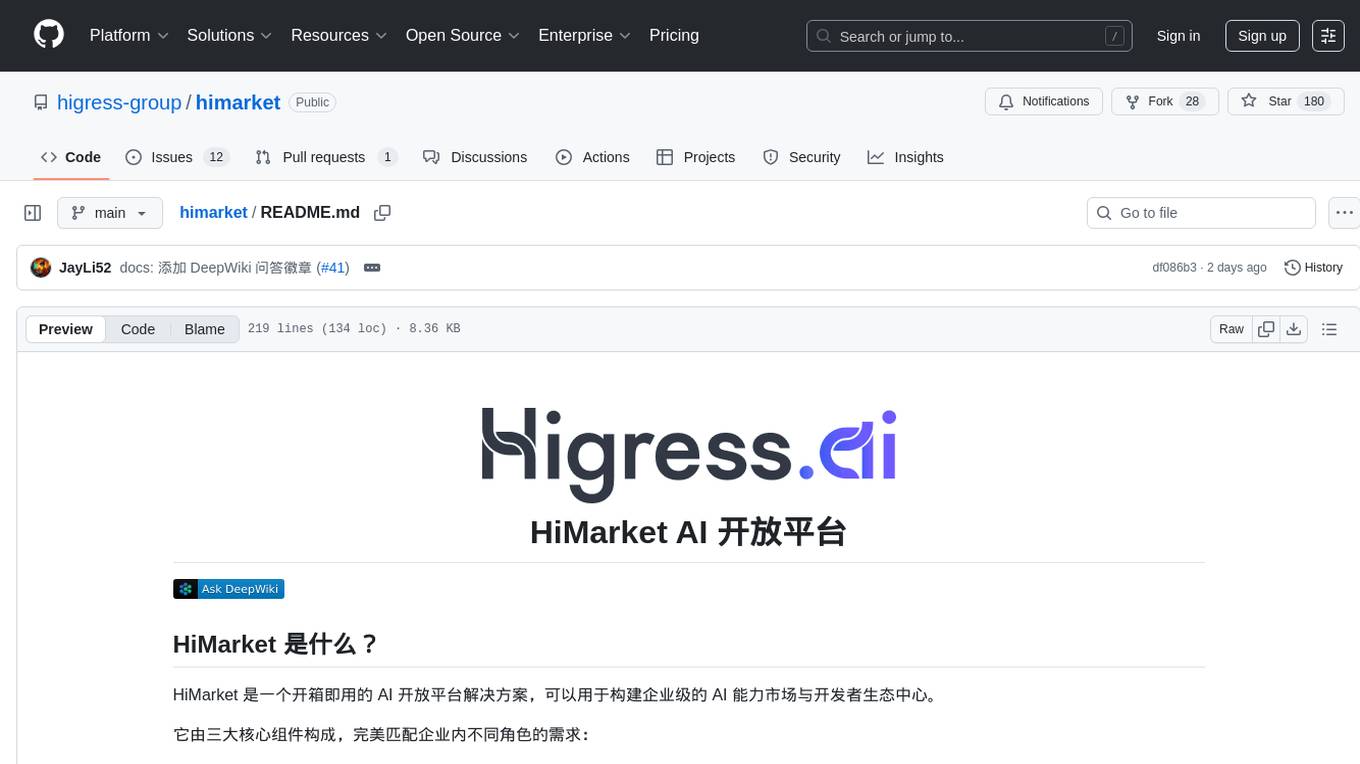
himarket
HiMarket is an out-of-the-box AI open platform solution that can be used to build enterprise-level AI capability markets and developer ecosystem centers. It consists of three core components tailored to different roles within the enterprise: 1. AI open platform management backend (for administrators/operators) for easy packaging of diverse AI capabilities such as model services, MCP Server, Agent, etc., into standardized 'AI products' in API form with comprehensive documentation and examples for one-click publishing to the portal. 2. AI open platform portal (for developers/internal users) as a 'storefront' for developers to complete registration, create consumers, obtain credentials, browse and subscribe to AI products, test online, and monitor their own call status and costs clearly. 3. AI Gateway: As a subproject of the Higress community, the Higress AI Gateway carries out all AI call authentication, security, flow control, protocol conversion, and observability capabilities.
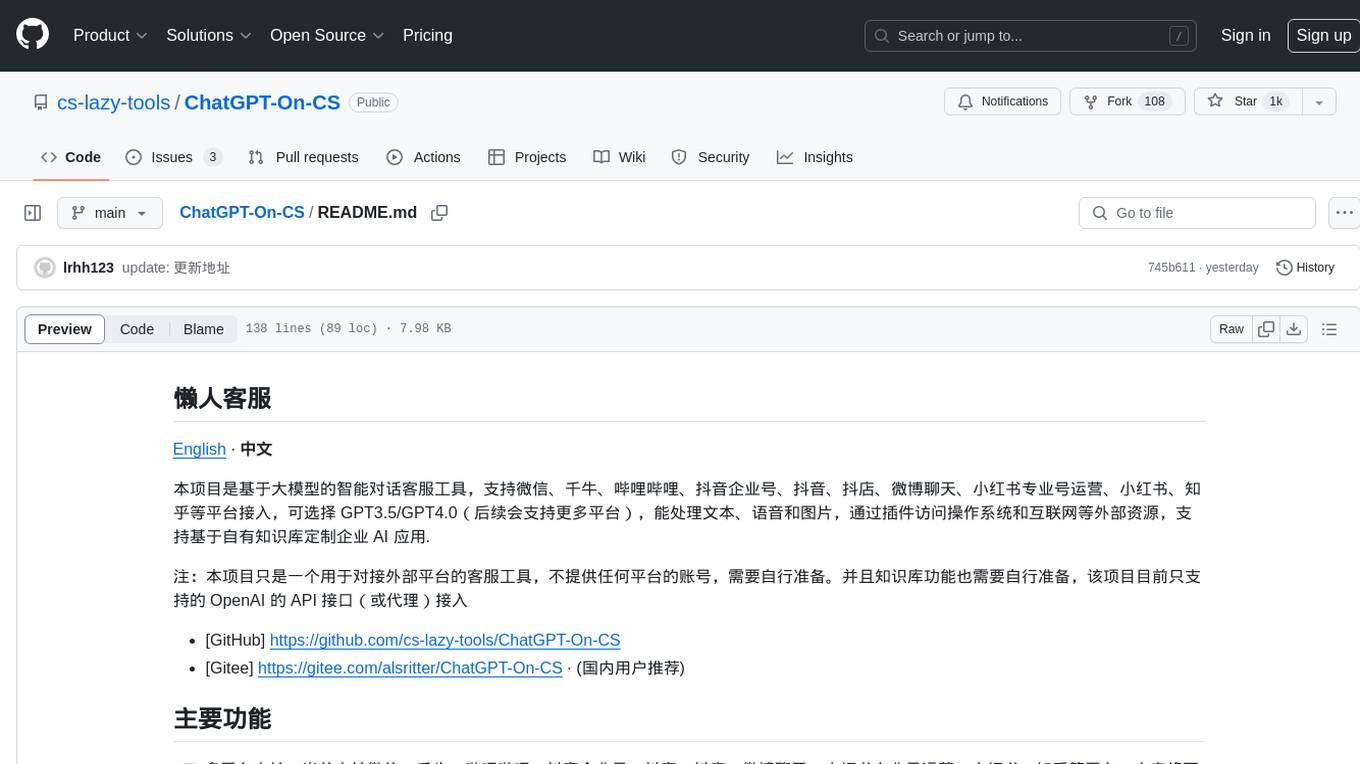
ChatGPT-On-CS
ChatGPT-On-CS is an intelligent chatbot tool based on large models, supporting various platforms like WeChat, Taobao, Bilibili, Douyin, Weibo, and more. It can handle text, voice, and image inputs, access external resources through plugins, and customize enterprise AI applications based on proprietary knowledge bases. Users can set custom replies, utilize ChatGPT interface for intelligent responses, send images and binary files, and create personalized chatbots using knowledge base files. The tool also features platform-specific plugin systems for accessing external resources and supports enterprise AI applications customization.
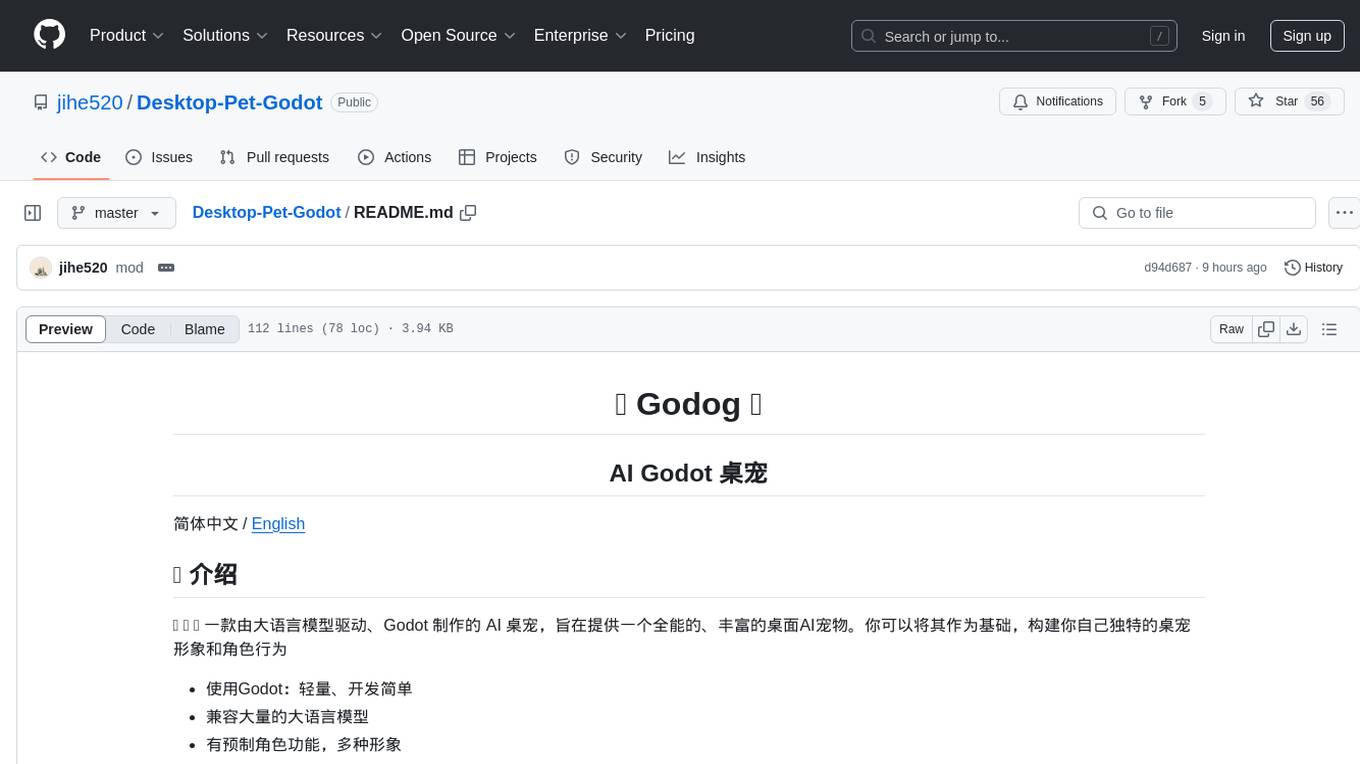
Desktop-Pet-Godot
Godog is an AI desktop pet powered by a large language model and created with Godot. It aims to provide a versatile and rich desktop AI pet that users can customize to create unique pet images and behaviors. The tool is lightweight, easy to develop with Godot, compatible with various large language models, offers pre-made character functions and multiple appearances, supports multimodal capabilities, and allows users to easily build their own AI desktop pets on top of the existing features.
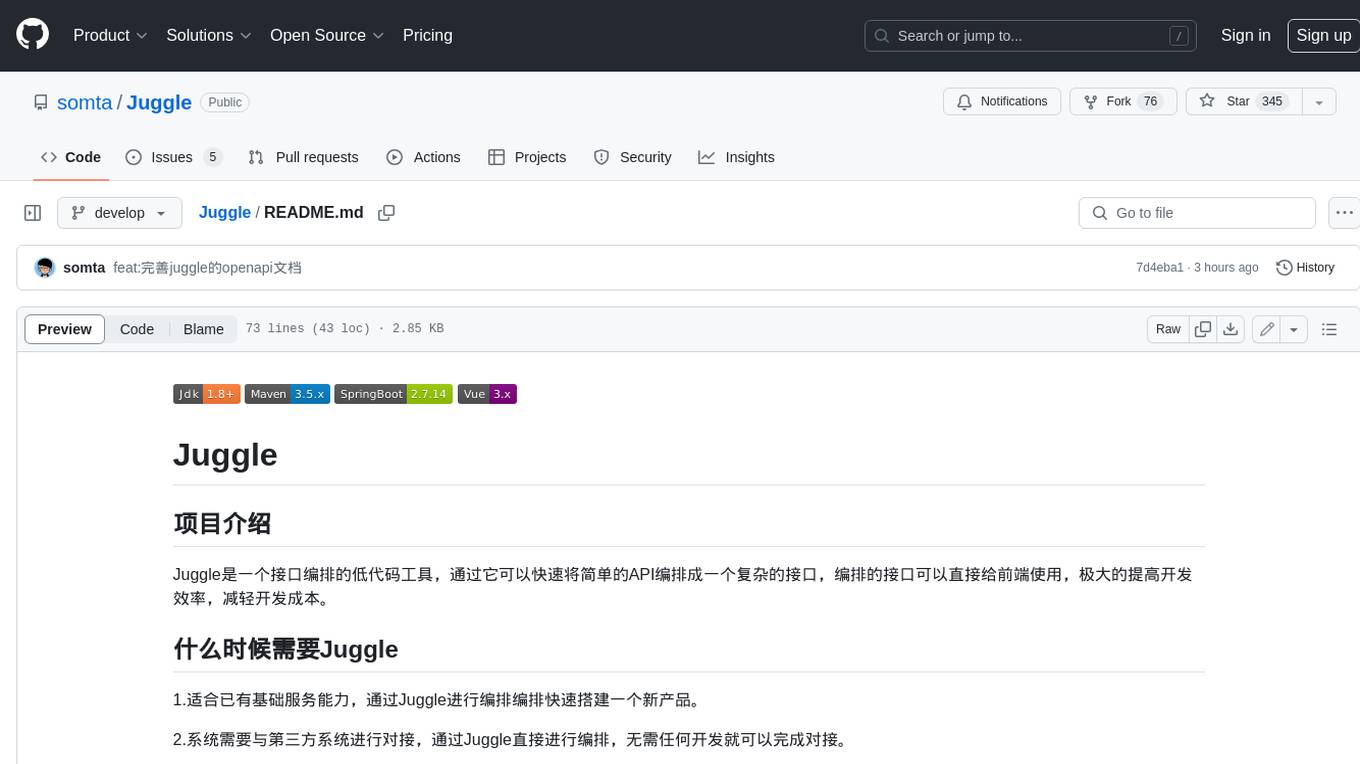
Juggle
Juggle is a low-code tool for interface orchestration, which can quickly orchestrate simple APIs into a complex interface. The orchestrated interface can be directly used by the front end, greatly improving development efficiency and reducing development costs.
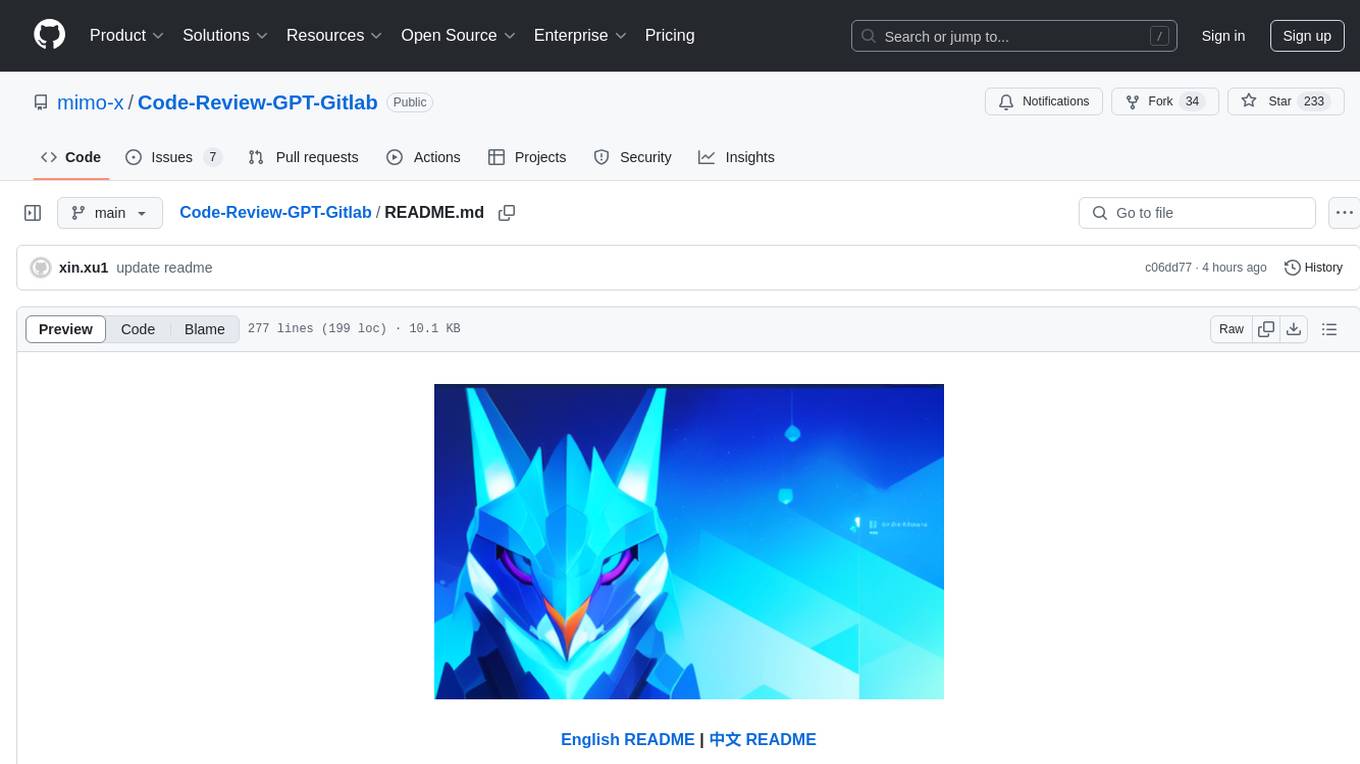
Code-Review-GPT-Gitlab
A project that utilizes large models to help with Code Review on Gitlab, aimed at improving development efficiency. The project is customized for Gitlab and is developing a Multi-Agent plugin for collaborative review. It integrates various large models for code security issues and stays updated with the latest Code Review trends. The project architecture is designed to be powerful, flexible, and efficient, with easy integration of different models and high customization for developers.
siliconflow-plugin
SiliconFlow-PLUGIN (SF-PLUGIN) is a versatile AI integration plugin for the Yunzai robot framework, supporting multiple AI services and models. It includes features such as AI drawing, intelligent conversations, real-time search, text-to-speech synthesis, resource management, link handling, video parsing, group functions, WebSocket support, and Jimeng-Api interface. The plugin offers functionalities for drawing, conversation, search, image link retrieval, video parsing, group interactions, and more, enhancing the capabilities of the Yunzai framework.
For similar tasks
Virtual_Avatar_ChatBot
Virtual_Avatar_ChatBot is a free AI Chatbot with visual movement that runs on your local computer with minimal GPU requirement. It supports various features like Oogbabooga, betacharacter.ai, and Locall LLM. The tool requires Windows 7 or above, Python, C++ Compiler, Git, and other dependencies. Users can contribute to the open-source project by reporting bugs, creating pull requests, or suggesting new features. The goal is to enhance Voicevox functionality, support local LLM inference, and give the waifu access to the internet. The project references various tools like desktop-waifu, CharacterAI, Whisper, PYVTS, COQUI-AI, VOICEVOX, and VOICEVOX API.

xiaozhi-esp32
The xiaozhi-esp32 repository is the first hardware project by Xia Ge, focusing on creating an AI chatbot using ESP32, SenseVoice, and Qwen72B. The project aims to help beginners in AI hardware development understand how to apply language models to hardware devices. It supports various functionalities such as Wi-Fi configuration, offline voice wake-up, multilingual speech recognition, voiceprint recognition, TTS using large models, and more. The project encourages participation for learning and improvement, providing resources for hardware and firmware development.
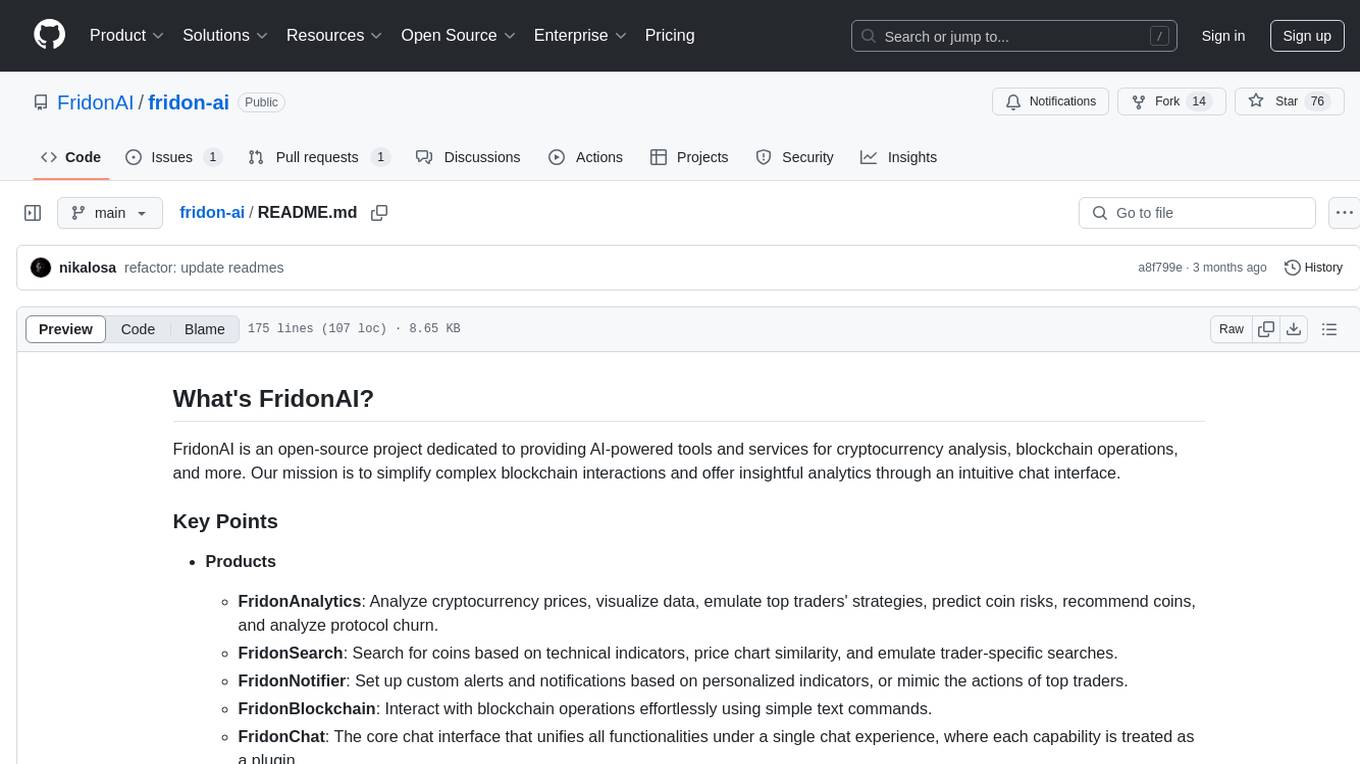
fridon-ai
FridonAI is an open-source project offering AI-powered tools for cryptocurrency analysis and blockchain operations. It includes modules like FridonAnalytics for price analysis, FridonSearch for technical indicators, FridonNotifier for custom alerts, FridonBlockchain for blockchain operations, and FridonChat as a unified chat interface. The platform empowers users to create custom AI chatbots, access crypto tools, and interact effortlessly through chat. The core functionality is modular, with plugins, tools, and utilities for easy extension and development. FridonAI implements a scoring system to assess user interactions and incentivize engagement. The application uses Redis extensively for communication and includes a Nest.js backend for system operations.
For similar jobs

xiaozhi-esp32
The xiaozhi-esp32 repository is the first hardware project by Xia Ge, focusing on creating an AI chatbot using ESP32, SenseVoice, and Qwen72B. The project aims to help beginners in AI hardware development understand how to apply language models to hardware devices. It supports various functionalities such as Wi-Fi configuration, offline voice wake-up, multilingual speech recognition, voiceprint recognition, TTS using large models, and more. The project encourages participation for learning and improvement, providing resources for hardware and firmware development.
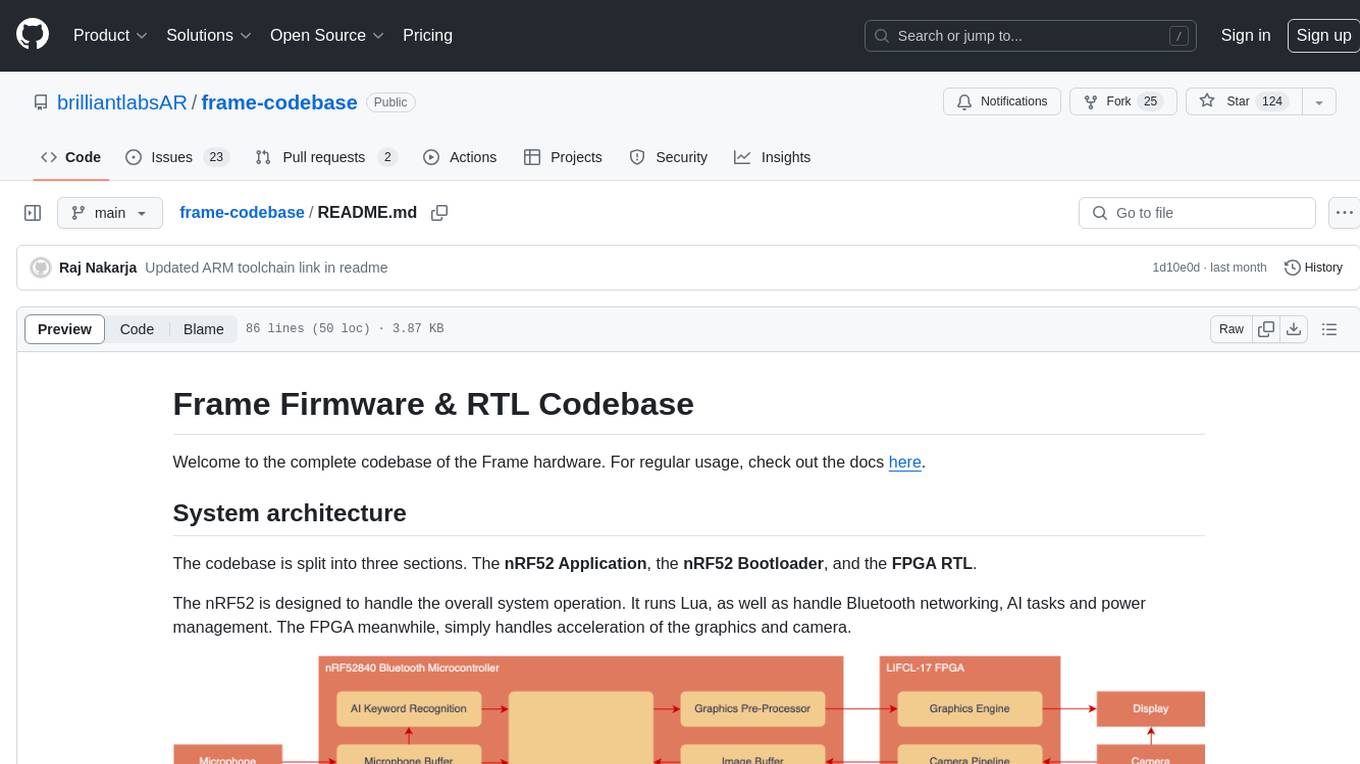
frame-codebase
The Frame Firmware & RTL Codebase is a comprehensive repository containing code for the Frame hardware system architecture. It includes sections for nRF52 Application, nRF52 Bootloader, and FPGA RTL. The nRF52 handles system operation, Lua scripting, Bluetooth networking, AI tasks, and power management, while the FPGA accelerates graphics and camera processing. The repository provides instructions for firmware development, debugging in VSCode, and FPGA development using tools like ARM GCC Toolchain, nRF Command Line Tools, Yosys, Project Oxide, and nextpnr. Users can build and flash projects for nRF52840 DK, modify FPGA RTL, and access pre-built accelerators bundled in the repo.
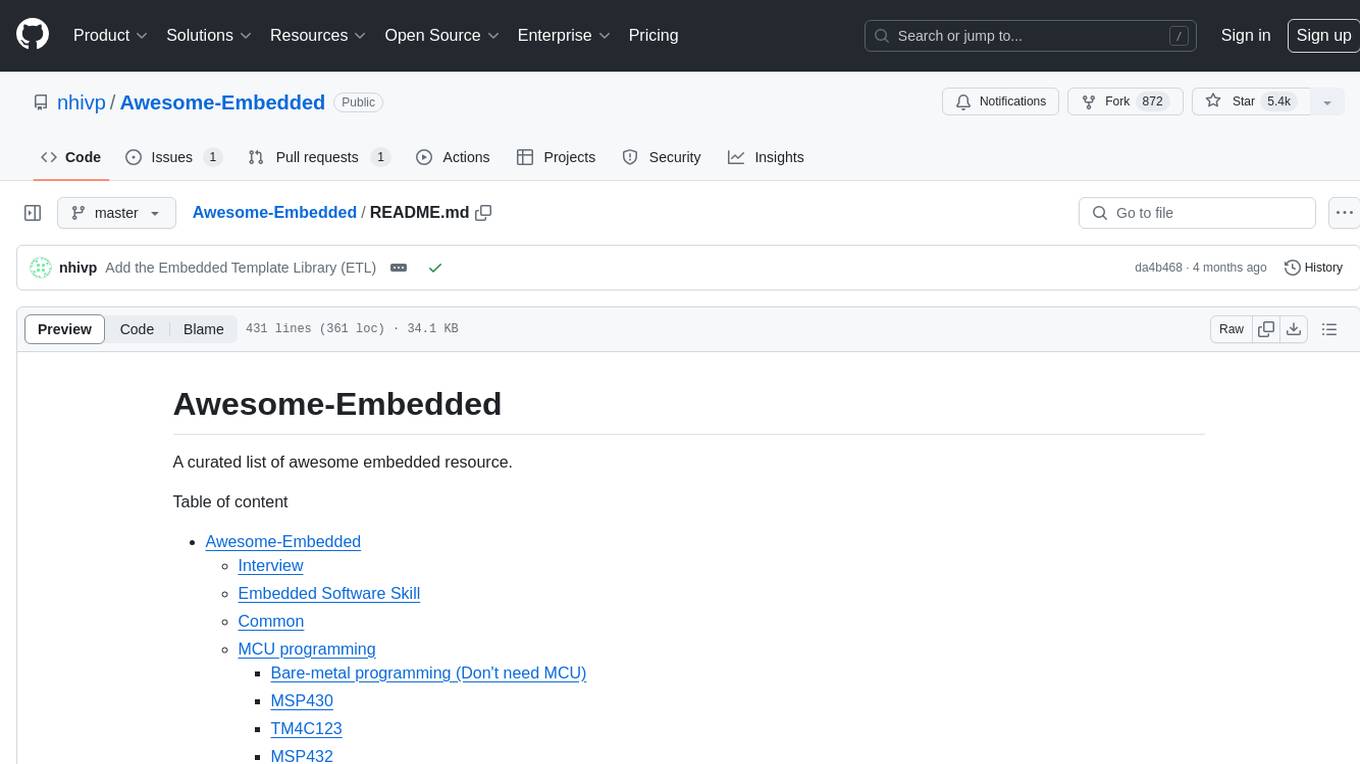
Awesome-Embedded
Awesome-Embedded is a curated list of resources for embedded systems enthusiasts. It covers a wide range of topics including MCU programming, RTOS, Linux kernel development, assembly programming, machine learning & AI on MCU, utilities, tips & tricks, and more. The repository provides valuable information, tutorials, and tools for individuals interested in embedded systems development.
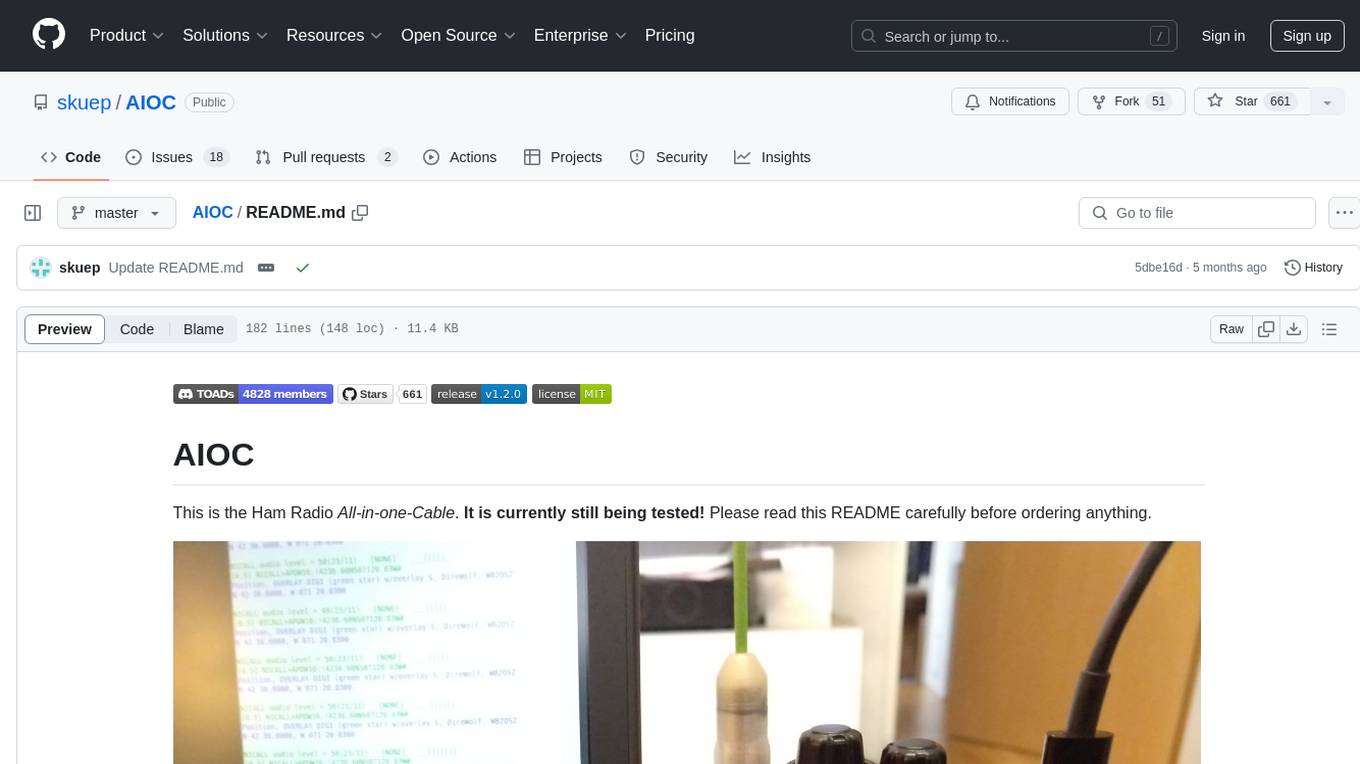
AIOC
AIOC is an All-in-one-Cable for Ham Radio enthusiasts, providing a cheap and hackable digital mode USB interface with features like sound-card, virtual tty, and CM108 compatible HID endpoint. It supports various software and tested radios for functions like programming, APRS, and Dual-PTT HTs. Users can fabricate and assemble the AIOC using specific instructions, and program it using STM32CubeIDE. The tool can be used for tasks like programming radios, asserting PTT, and accessing audio data channels. Future work includes configurable AIOC settings, virtual-PTT, and virtual-COS features.
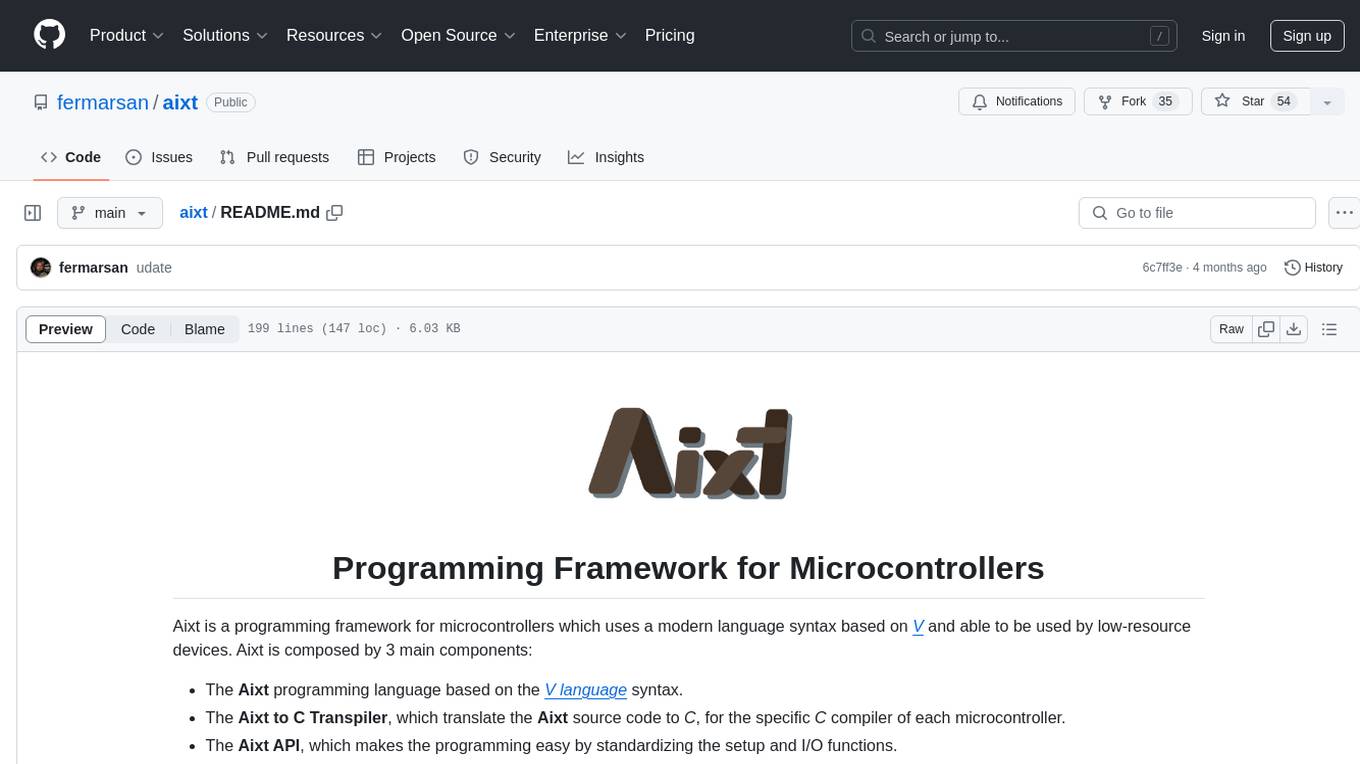
aixt
Aixt is a programming framework for microcontrollers using a modern language syntax based on V, with components including the Aixt programming language, Aixt to C Transpiler, and Aixt API. It is designed to be modular, allowing easy incorporation of new devices and boards through a TOML configuration file. The Aixt to C Transpiler translates Aixt source code to C for specific microcontroller compilers. The Aixt language implements a subset of V with differences in variables, strings, arrays, default integers size, structs, functions, and preprocessor commands. The Aixt API provides functions for digital I/O, analog inputs, PWM outputs, and serial ports.













